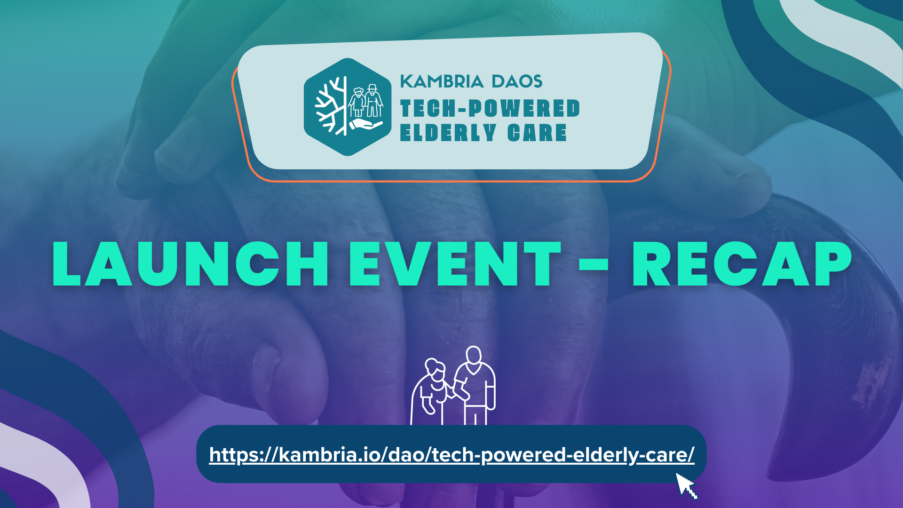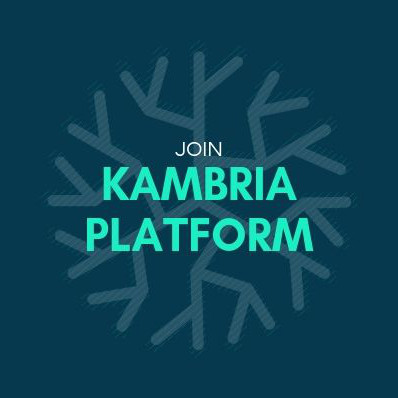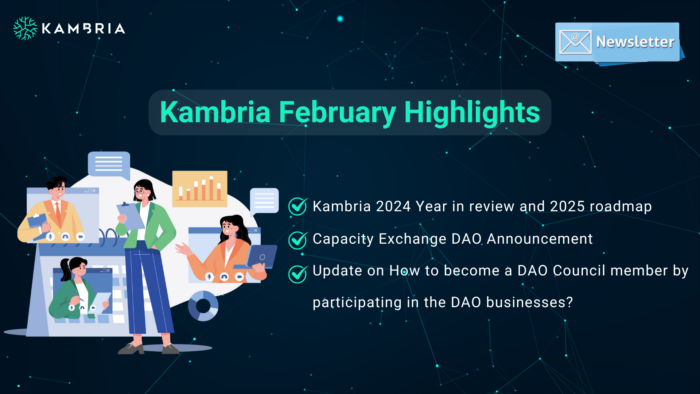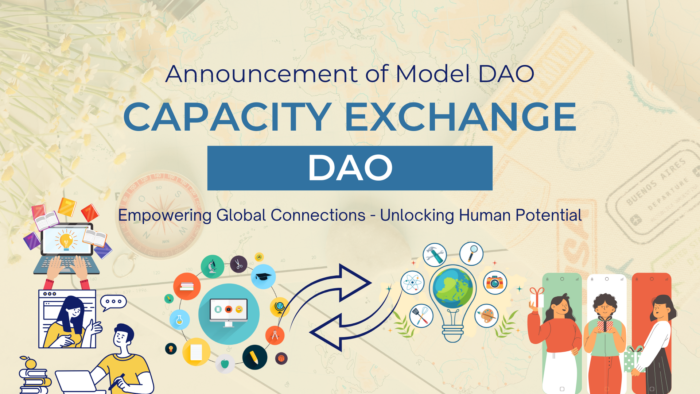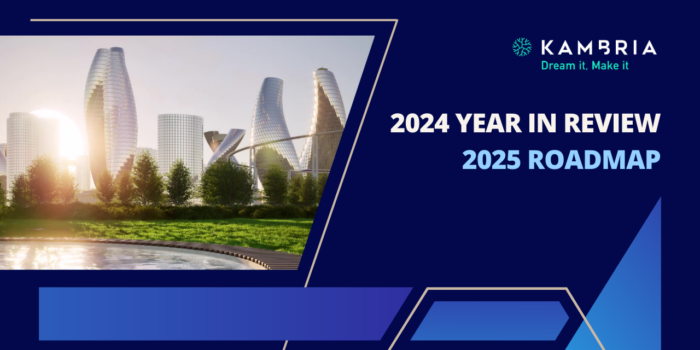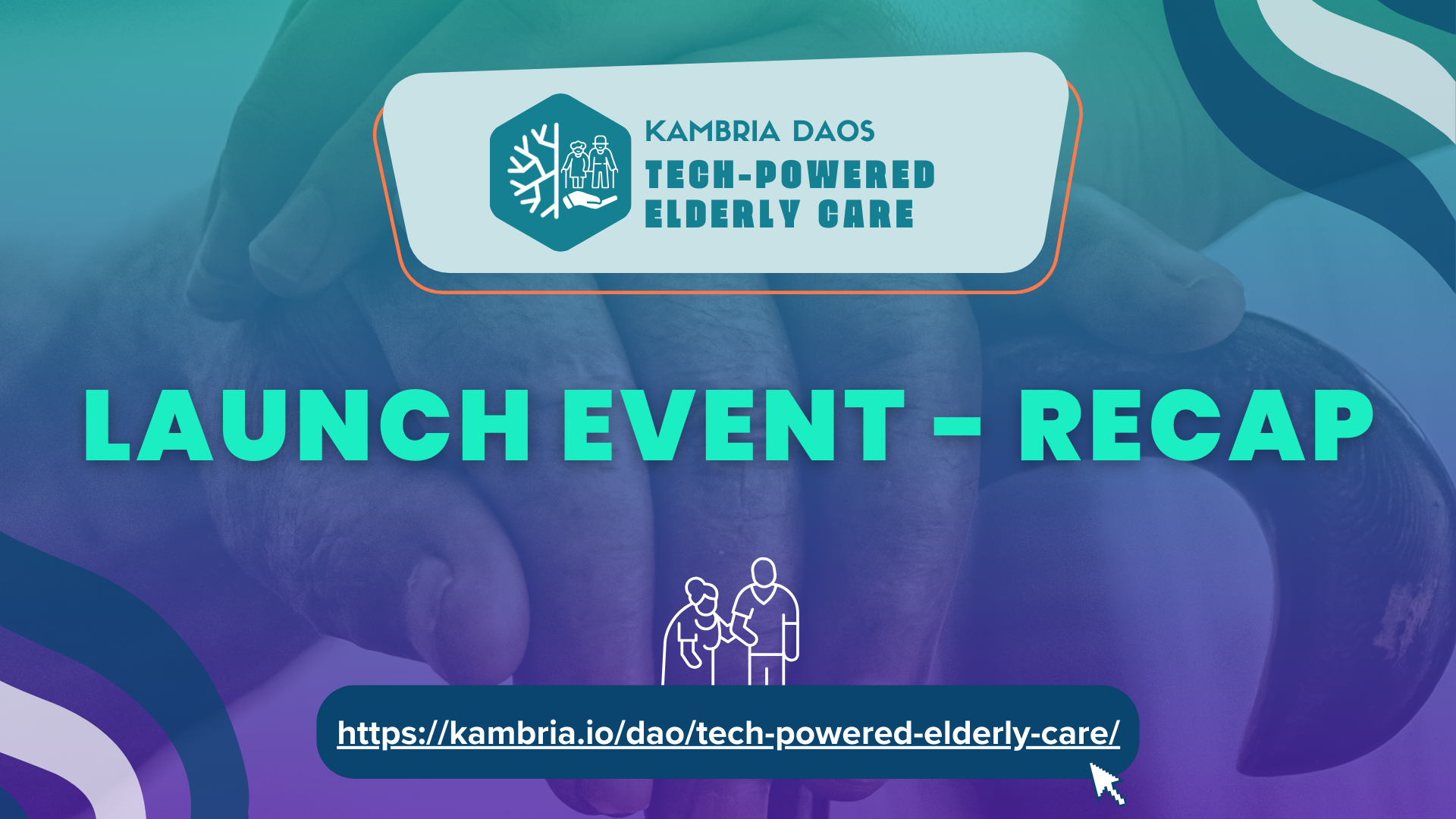
Kambria successfully organized the Tech-powered Elderly Care DAO (TECD) Launch Event on November 29th, 2024.
This Model DAO showcases Kambria's efforts in building infrastructure for Kambria DAOs. Besides, in the Model DAO, Kambria will play the role of DAO Dev Partner as a demonstration of the solution development journey.
Table of Contents
- Highlights of this Event
- 1️⃣ Introduction
- 2️⃣ Proposal Presentation and Q&A
- 3️⃣ Kickoff Speech from Kambria
- 4️⃣ Thanks and Closing Up
Highlights of this Event
The Event includes 4 key sessions:
1. Introduction: Kambria introduces Tech-powered Elderly Care DAO Launch Event Guests & Participants
2. Proposal Presentation and Q&A: Kambria Dev Team’s Presentation, Q&A with the Judge Committee to evaluate and provide feedback on proposed solutions
3. Kickoff Speech from Kambria: Kick start the DAO fundraising and share instructions on how to become a member of the DAO or DAO Council
4. Thanks and Closing Up
Full video:
- - - - - 🔹 - - - - -
1️⃣ Introduction
The Tech-powered Elderly Care DAO (TECD) Launch Event was a momentous occasion, bringing together innovation, expertise, and a shared passion for elder care.
The Event featured three key segments: Introduction, Proposal Presentations and Q&A, and a Kickoff Speech by Kambria, marking the initiation of the DAO’s fundraising phase. The audience had the opportunity to engage with the Dev Team, the Judge Committee, and the broader community, fostering a collaborative environment for impactful innovation.
The session was enriched by the presence of four esteemed experts serving on the Judge Committee:
- Industry Expert: Ms. Neha Sinha, CEO and Co-founder of Epoch Elder Care, shared her dedication to elder care through innovative dementia care models and active ageing initiatives. Her expertise in clinical psychology brings a person-centered approach to elder care.
- Business Expert: Mr. Arturs Bernovskis, Founder of Efectio, specializes in digital strategy and employee well-being.
- Technical Experts:
- Mr. Hai Dang, Director of Engineering at OhmniLabs, highlighted his vast experience in robotics and software engineering, leading the development of groundbreaking products such as Telepresence and OhmniClean robots.
- Mr. Son Do, Product/Program Manager at Lombard Odier Group, brought his expertise in Human-Computer Interaction and strategic transformation, emphasizing user-centered approaches and agile methodologies in enhancing technology solutions.
This Event serves as a call to action for innovators, investors, and the community to join hands in shaping a future where technology fosters connection and well-being across generations. Stay tuned for updates and get involved in this transformative journey.
Video:
2️⃣ Proposal Presentation and Q&A
Proposal Presentation
DAO Solution Proposal: Context, Development, and Vision
The Solution Proposal for Kambria’s Model DAO TECD was presented by Mr. Ivan Ta and Ms. Thao Tran. This innovative solution addresses the needs of the rapidly aging population, with a strong focus on commercialization by 2024. Key highlights of the presentation include the proposal structure, development timeline, and cost estimates.
Context and Solution Overview
Mr. Ivan Ta outlined the context of the Tech-powered Elderly Care DAO. This Model DAO showcases Kambria's efforts in building infrastructure for Kambria DAOs. Besides, in the Model DAO, Kambria will play the role of DAO Dev Partner as a demonstration of the solution development journey.
In overview, the technology solution of this DAO addresses Seniors’ need for companionship, combined with learning and experiencing certain subjects (for example making recycled crafts together). By connecting them in online, real-time sessions with young persons.
- The solution is deployable on home devices such as smartphones, laptops and tablets
- It also incorporates AI voice assistance.
- Potential market includes subscriptions to learn and experience, and compensations for sharing.
- And the solution will be extended to a two-way platform in the next phase.
The proposal highlights the global Senior care tech market, which is expected to grow from $43 billion in 2022 to $76 billion by 2032. With 2.1 billion people aged 60+ by 2050, the market is both large and critical. The MVP development aims to demonstrate Kambria’s commitment to enhancing human interaction through technology.
Development Plan and Key Features
Ms. Thao Tran detailed the development journey, emphasizing the MVP completed over seven months (February - August 2024). The MVP includes:
- A mobile and web application compatible with common devices.
- Features like session scheduling, video meetings, and dual-device functionality for interactive activities.
- An AI voice assistant that aids Seniors in setup and provides Q&A support.
- Payment integration for subscriptions, Senior compensation, and DAO revenue sharing via smart contracts.
The MVP currently supports Vietnamese and will expand to English and other languages in future phases. The next development phase (September 2024 - May 2025) will refine existing features and add:
- Weekly recurring session functionality.
- User ratings and reviews.
- On-ramps and off-ramps integration.
- Enhanced AI voice assistant capabilities.
Cost Estimates and Quotation
The total quotation for development and experimentation is $120,000, covering salaries for a team of 11 part-time members. This budget includes the MVP development phase and the complete solution development phase for the first product cycle.
DemonstrationThe presentation concluded with an invitation to review demo videos during the Q&A session, showcasing the functionality and usability of the TECD MVP.
Video:
Q&A
The Q&A session allowed each member of the Judge Committee to take turns sharing questions and feedback, diversifying perspectives and providing valuable insights to the Kambria Dev Team.
Round 1
A. Mr. Son Do’s questions and feedback
Question 1: Understanding the Business Model
Mr. Son Do noted to know more about the target audience and concrete offerings of TECD solution. He asked for an explanation about what the platform does and how it helps Seniors connect with the world.
Ms. Thao Tran responded by explaining that TECD aims to address Seniors' needs for connection and engagement. The platform enables Seniors to participate in online sessions with SeniorBuddies, offering activities like crafting, meditation, and so on. These sessions are designed to foster interaction and reduce loneliness. Families can subscribe to the platform, and Seniors can book sessions easily through the TECD App .
Question 2: Accessibility for Tech-Challenged Seniors
Mr. Son Do shared a specific scenario about his 90-year-old grandmother, who is unfamiliar with smartphones and the internet, and questioned how she could navigate the App independently.
Ms. Thao explained that TECD works with nursing homes and family members to introduce Seniors to the App initially. AI support within the App assists Seniors by guiding them through the session step-by-step, such as arranging the devices before the session. Additionally, family members, referred to as "SeniorFamilies," can help Seniors get started.
Question 3: Encouraging Family Involvement
Mr. Son Do raised concerns about family members already being busy and questioned the practicality of relying on their support to onboard Seniors.
Ms. Lien Cao shared her personal experience, emphasizing that TECD encourages families to accompany Seniors in using the App, as it strengthens intergenerational bonds. She highlighted how sitting with her mother during TECD sessions brought meaningful interactions.
Feedback
Mr. Son Do highlighted a key challenge: families turn to services like TECD because they lack time to engage with Seniors during the day. He suggested that the platform's value lies in providing companionship for Seniors during these gaps, complementing family members’ efforts rather than relying on them.
B. Mr. Hai Dang’s questions
Questions from Mr. Hai Dang:
Mr. Hai Dang wanted the team to share their journey piloting the TECD project with senior members, reflecting on the challenges they have observed, the areas that need improvement to align with the project's higher vision, and the significant "aha moments" they experienced during this journey.
Technical Insights from Mr. Anh Phan:
Mr. Anh Phan highlighted the team's technical growth, emphasizing the integration of cutting-edge technologies in web, mobile applications, and AI training to support seniors. This journey provided the team with valuable learning experiences and the excitement of working with diverse tech stacks.
Reflections from Ms. Thao Tran:
Ms. Thao Tran shared a memorable moment from a pilot session where Seniors and Buddies participated in a meditation activity. One Senior, Ms. Phu, particularly enjoyed the session, describing it as engaging and uplifting. The SeniorBuddy, Tram Anh, facilitated discussions on mental health and life stories, fostering meaningful cross-generational connections. Despite residing in different cities (Hanoi and Ho Chi Minh City), the two bonded through TECD, underscoring the platform's potential to connect and enrich lives.
Shared Experiences from Mr. Ivan Ta:
Another highlight involved Ms. Phu learned to paint with guidance from a SeniorBuddy. For Ms. Phu, this was her first painting experience, which she proudly completed. The activity not only brought her joy but also earned praise from nursing home staff, who noted its positive impact on her happiness and engagement. This demonstrates TECD’s ability to encourage skill development and foster new experiences for Seniors.
Personal "Aha Moment" from Ms. Lien Cao:
Ms. Lien shared a deeply personal moment when she joined her mother in a SeniorBuddy-led meditation session. For the first time, her mother revealed memories and thoughts that Ms. Cao had never heard of it. This experience had a profound impact, even saving her mother's life - a story she hopes to share more fully in the future. For Ms. Lien Cao, this moment solidified the transformative potential of TECD to strengthen family bonds and bring hidden emotions to light.
C. Ms. Neha Sinha’s questions
Question from Ms. Sinha:
Ms. Neha Sinha inquired about the sharp use case of TECD, seeking clarity on the fundamental problem it addresses. She questioned whether the platform is solely focused on engagement or if it serves additional purposes. Furthermore, she highlighted that seniors often have family members or nursing home staff for assistance and asked how TECD adds value beyond providing companionship or fostering independence.
Answer from Ms. Thao Tran:
Ms. Thao Tran clarified that TECD aims to create meaningful interactions and experiences for seniors, distinct from existing solutions in the market. Unlike AI health monitors or robotic companions focused on physical health, TECD prioritizes real human connection through online sessions with trained SeniorBuddies. These SeniorBuddies possess the skills to engage seniors in activities that foster mental stimulation, social engagement, and emotional well-being.
She highlighted TECD's unique positioning by comparing it to other elderly care solutions:
- AI or robotic companions emphasize health monitoring, while TECD promotes social and cognitive benefits through interpersonal interactions.
- Cognitive apps focus on individual activities, whereas TECD enables group engagement, enhancing mental stimulation and fostering connections.
- Smart home solutions ensure physical safety, but TECD complements this by addressing seniors’ emotional and social needs.
D. Mr. Arturs Bernovskis’s questions
Question from Mr. Arturs Bernovskis:
Mr. Arturs Bernovskis asked for concrete data or insights that demonstrate the demand for the DAO in the target markets. He also inquired about how the total addressable market (TAM) is quantified and what market share the team aims to capture in the coming years.
Answer from Ms. Thao Tran:
Ms. Thao Tran addressed the question by outlining global and local aging trends, highlighting the increasing demand for platforms like TECD to combat social isolation among Seniors.
Globally, the aging population is rapidly rising, with the UN projecting 2.1 billion Seniors by 2050. Approximately 20% of this demographic suffers from mental health or neurological disorders, underscoring the need for social connection platforms. Focusing on Vietnam, one of the fastest-aging countries:
- In 2019, Vietnam had 11.41 million Seniors, projected to grow to 16.53 million by 2029.
- Surveys reveal that 70% of Vietnamese Seniors seek friendship and social activities to combat loneliness.
From a numerical perspective, Vietnam’s Senior population was 12 million in 2021 and is expected to reach 22 million by 2050. Globally, the elderly population will surpass 1 billion by 2024. Assuming 20% are digitally literate and open to virtual activities, the serviceable market is approximately 2.4 million seniors in Vietnam and 200 million globally.
Market Share Goals:
TECD has a phased approach to tap into this market:
- Year 1 (pilot phase): Targeting 0.05% of Vietnam’s TAM (~1,200 Seniors).
- Year 3: Expanding to 1% of Vietnam’s TAM (~24,000 Seniors) and 0.05% of the global TAM (~10,000 Seniors).
- Year 5: Aiming for 0.1% of the global TAM (~200,000 Seniors).
TECD sees a vast and growing market with significant potential to reduce social isolation and improve seniors’ quality of life. By leveraging innovative and accessible technology, TECD aims to create meaningful connections and provide scalable solutions for seniors worldwide.
Round 2
A. Mr. Hai Dang’s questions
Question: The Utilization of AI
Mr. Hai Dang expressed his belief that the technology serves as an enabler for the platform being developed and emphasized the significance of the people involved and the ecosystem created around the project. He mentioned that these elements are crucial for the project's success. Additionally, he conveyed a slight curiosity about how AI is being utilized in the project, specifically asking if its application has been materialized and inquiring about its performance during the pilot phase.
Answer from Mr. Ivan Ta:
Mr. Ivan Ta thanked Mr. Hai Dang for his question and proceeded to share a video demo of the AI voice assistant. Before showing the video, he outlined the development timeline for the AI voice assistant, explaining that the MVP version was developed from February to August of this year, focusing on device arrangement instructions with the project centered around "Recycled Crafts" using the Rasa framework and Vietnamese language.
He then detailed future updates: TECD 1st complete solution, planned from September to April next year, would expand the language options to include English and maintain the focus on device arrangement instructions. TECD phase 2 would introduce safety conversations as a use case, supporting both Vietnamese and English, and employing the OpenAI framework to enhance user interactions by detecting unsafe words in conversations between Seniors and their Buddies.
Mr. Ta also demonstrated some features of the AI voice assistant, highlighting its ability to respond with voice, text, and images to facilitate clear communication during the Senior chat sessions.
B. Mr. Son Do’s questions
Question: Competitive Differentiation in a Crowded Marketplace
Mr. Son Do raised a question concerning the business model and market positioning of the platform, likening it to a marketplace that connects socially isolated Seniors with younger individuals, referred to as "SeniorBuddies." He assumed that these SeniorBuddies might provide services to Seniors potentially in exchange for monetary compensation, possibly through a commission-based model.
Highlighting the competitive landscape, Mr. Son Do drew parallels with existing platforms like Preply, a tutoring platform that connects students with tutors for language lessons and other subjects using live video sessions and various communication tools. He questioned how the platform could compete with such established services, which already have proven business models, technical stability, and integrated AI capabilities.
His main inquiry was about the unique aspects of the platform that would differentiate it from competitors who might also consider targeting the same market segment of connecting elderly people with younger helpers, potentially replicating the business model with their own marketing strategies. He sought to understand the distinctive features or strategies that would safeguard the platform's competitive edge in a crowded marketplace.
Answer from Ms. Thao Tran:
Ms. Thao Tran acknowledged the complexities highlighted by Mr. Son Do’s question, appreciating its relevance and difficulty. She then explained two key strategies employed by their platform to ensure user engagement and growth.
Firstly, Ms. Tran detailed the user acquisition strategy, focusing on the unique challenges of engaging both Seniors and SeniorBuddies. The approach includes integrating the platform into university courses as an experiential learning tool, particularly in psychology and mental health therapy. This method aims to attract both student volunteers and Seniors, providing practical experience for students while offering companionship and care for Seniors.
Secondly, she discussed their partnership strategy, mentioning collaborations with nursing homes to study the impacts of their platform on elderly care and intergenerational bonding. These initiatives also serve as a foundation for their marketing and community-building efforts, engaging professionals like lecturers as expert SeniorBuddies and utilizing student ambassadors to broaden outreach.
Ms. Tran emphasized the ongoing development of interactive features that enhance user experience. She shared a demo showing how their platform facilitates real-time interactive sessions between Seniors and SeniorBuddies using integrated devices, allowing participants to engage in activities like drawing and recycling projects. These practice sessions not only enhance learning but also foster meaningful connections, effectively bridging the gap between Seniors and young volunteers through technology.
Throughout her response, Ms. Tran underscored the commitment to building a unique platform that not only connects different generations but also enriches their interactions, setting their service apart in the competitive landscape.
Answer from Mr. Ivan Ta:
Mr. Ivan Ta responded by emphasizing the adaptability and broad scope of their TECD solution, noting that it does not limit itself to a single subject or topic. He highlighted that their approach is to diversify the topics available, tailoring them to the specific interests and needs of Seniors. During the experimentation phase, they actively solicit feedback from Seniors on what subjects they would like to explore or discuss during sessions with their SeniorBuddies. This process allows for a more personalized and engaging experience, ensuring that the content remains relevant and stimulating for the Seniors.
C. Ms. Neha Sinha’s questions
Question 1: Content Selection Strategy: Research Relevance to Vietnam
Ms. Neha Sinha asked about the basis for selecting the topics listed for content development on the platform, specifically questioning whether they were chosen based on research relevant to Vietnam. She inquired about the method used to identify and pick these topics, seeking to understand the process and rationale behind the content strategy for the platform, particularly in relation to its cultural and regional applicability.
Answer from Ms. Thao Tran:
In response to Ms. Neha Sinha's inquiry about the basis for the selection of topics on the platform, Thao Tran explained the multi-faceted approach taken to ensure the relevance and engagement of the content. Initially, the topics were generated through direct conversations with Seniors, asking them about their interests and what they wish to learn or discuss with their SeniorBuddies. This was complemented by interactions and interviews with nursing home staff, who provided additional insights into the preferences and needs of the Seniors.
Thao noted that during the experimentation phase, they actively observed and recorded which topics garnered the most interest and engagement from the Seniors and which were less popular. This continuous feedback loop, consisting of surveys, discussions, and observational studies, helped refine and expand the list of topics offered on the platform.
She highlighted that suggestions from nursing home staff also played a crucial role, specifically mentioning how they contributed ideas for topics like music therapy, which is beneficial for Seniors with dementia. This iterative and responsive approach ensures that the content remains dynamically aligned with the evolving interests and needs of the Seniors, providing a tailored and effective engagement on the platform.
Question 2: Ensuring User Retention and Engagement on the Platform
Ms. Neha Sinha questioned the factors that would motivate users to continuously engage with the platform, probing the mechanisms in place to ensure user retention and maintain interest. She emphasized the importance of understanding what drives users to return, whether for learning, mental health benefits, or other health-related reasons. Additionally, she inquired about the existence of a feedback mechanism designed to enhance the application's appeal and stickiness, ensuring sustained user engagement.
Answer from Ms. Lien Cao:
Ms. Lien Cao addressed Ms. Neha Sinha's concerns about user retention and engagement by sharing insights from their experimentation phase. She acknowledged that acquiring users is a significant challenge for the platform, but once users engage, they tend to remain due to the positive experiences they encounter. Despite encountering technical issues, Seniors have expressed high satisfaction with their initial interactions with the platform, showing enthusiasm for expanding the variety of subjects and sessions available. This feedback indicates strong user retention, driven by the platform's ability to engage and meet the expectations of its users. Ms. Lien Cao emphasized that the main focus is on improving strategies to attract more users to the platform, leveraging their robust retention capabilities.
Question 3: Senior Involvement in Experimentation Phase
Ms. Neha Sinha inquired about the number of Seniors who participated during the experimentation phase of the platform, seeking to understand the initial testing periods.
Answer from Ms. Lien Cao:
In response to Ms. Neha Sinha's inquiry about the number of seniors involved in the experimentation phase, Ms. Lien Cao clarified that their initial testing included participation from 5 seniors, with 2 of these individuals being from a nursing home.
D. Mr. Arturs Bernovskis’s questions
Question: Addressing Scalability in Blockchain-Driven Platforms
Mr. Arturs Bernovskis raised concerns about the scalability challenges faced by platforms that utilize blockchain technology. He specifically asked about how the platform plans to handle issues related to transaction throughput and cross-chain interoperability, crucial factors that could impact the platform's performance and user experience as it scales.
Answer from Mr. Ivan Ta:
Mr. Ivan Ta discussed several scalability challenges that the platform may encounter. The first is transaction throughput, where a limited number of transactions per second can cause confirmation delays. The second challenge is cross-chain interoperability, as Kambria DAOs are managed on XDAO, a third-party platform that supports only one blockchain per DAO. The third challenge involves high gas fees on blockchains like Ethereum, which could deter user participation. Lastly, network congestion could cause delays and increased costs during peak periods.
To overcome these challenges, Mr. Ta outlined several strategic solutions. The platform plans to implement hybrid solutions that combine on-chain and off-chain processing to balance load and improve efficiency. They are also planning to integrate Layer-2 solutions, specifically adding Polygon to the Kambria token network next year, and are considering the development of a custom sidechain after successfully commercializing multiple DAOs. Additionally, a decentralized rollout of services will support gradual multi-chain integration to minimize strain, and the adoption of Sharding in networks like Ethereum 2.0 is expected to enhance throughput and reduce congestion risks in the future.
Video:
3️⃣ Kickoff Speech from Kambria
Ms. Lien Cao, CEO of Kambria, shared insights on the initiation of DAO fundraising and explained how to become a member of the DAO or the DAO Council. The presentation marked an inspiring call to action for the community to join the Tech-powered Elderly Care DAO (TECD), fostering love across generations through innovative care solutions. This initiative is part of Kambria's mission to drive impactful, technology-powered solutions addressing societal needs.
Kambria, an open innovation platform launched in 2018, focuses on deep tech fields such as AI, robotics, blockchain, AR/VR, and IoT. Kambria’s vision is to reshape technology innovation by decentralizing and democratizing its development and commercialization. Through seven initiatives, Kambria has been refining a sustainable model for open innovation, culminating in its DAO-driven approach.
The Kambria DAO model empowers communities to co-create and commercialize open-source solutions. This decentralized organization is built on blockchain, ensuring transparency, trust, and automation. The DAO model allows members to contribute to and benefit from the development of tech solutions. Kambria launched its first four Robotics Impact DAOs in 2023,. In 2024, it introduced four Daily-life Impact DAOs, including TECD, which integrates human interaction with AI to enhance elderly care.
Kambria DAOs operate through partnerships, including developers, manufacturers, distributors, and service implementers. Members gain benefits such as revenue sharing, access to the solution codebase, and decision-making roles in the DAO Council. Kambria also designed a governance model balancing the perspectives of financial contributors and active contributors. The TECD fundraising campaign uses XDAO as a platform, with a goal of $3 million across multiple product cycles and a current Alpha campaign target of $450,000.
TECD is already advancing with significant milestones, including developing a solution MVP, hosting Info Sessions, and integrating smart contracts into XDAO for transparent transactions. Kambria plays a leading role in the commercialization of TECD Vietnam DAO Hub.
If you are passionate about social impact, decentralized innovation, and technology solutions, the Tech-powered Elderly Care DAO is an incredible opportunity. Whether as an investor or partner, you can be part of this transformative journey.
If you're eager to be part of this groundbreaking initiative, stay tuned for the Token Sale opening this February.
Let’s work together to shape a future where technology empowers communities and enhances lives.
Video:
4️⃣ Thanks and Closing Up
As we wrapped up this remarkable Event, we extended a heartfelt thank you to all participants and contributions. Their engagement and insights have been invaluable, adding depth to our discussions and providing essential feedback to support the Kambria Dev Team in finalizing our innovative solution.
We are thrilled to announce the Official Launch of Tech-powered Elderly Care DAO! This milestone marks the beginning of a transformative journey toward redefining elderly care through technology and community collaboration. To stay connected and access detailed updates and discussions, we invite you to join the Kambria Discord channel.
We hope you enjoyed the event as much as we did and found it inspiring and enriching. If you have additional questions or suggestions, please don't hesitate to reach out. Your input is always welcome as we continue to innovate and grow.
Video:
